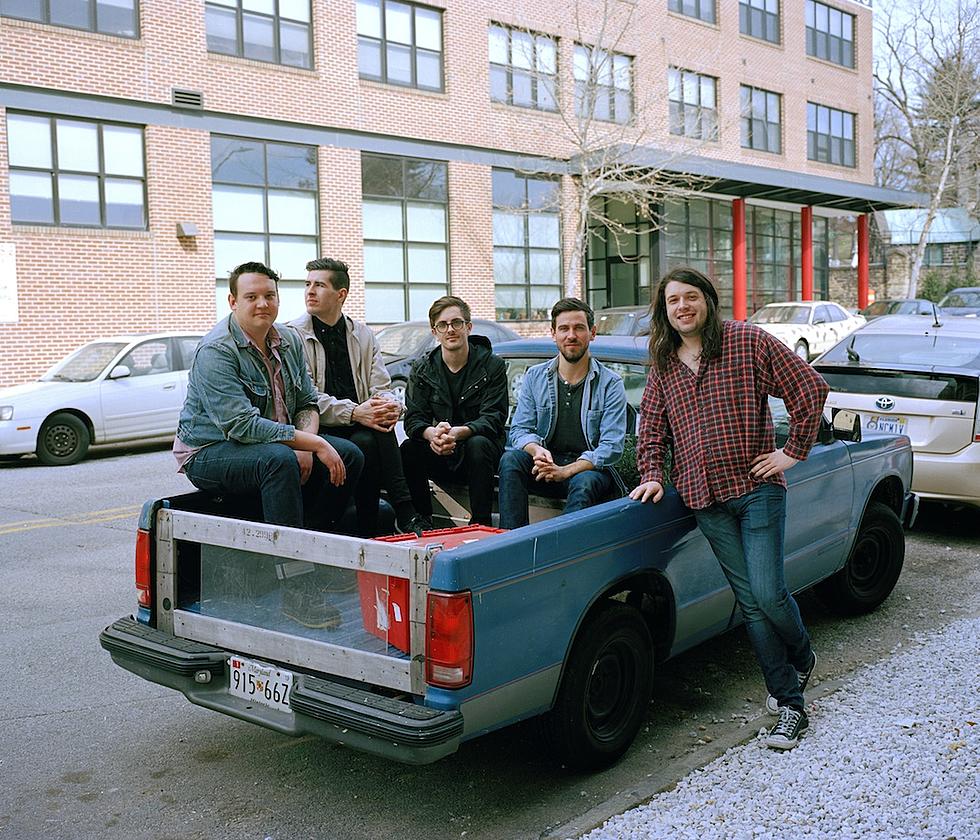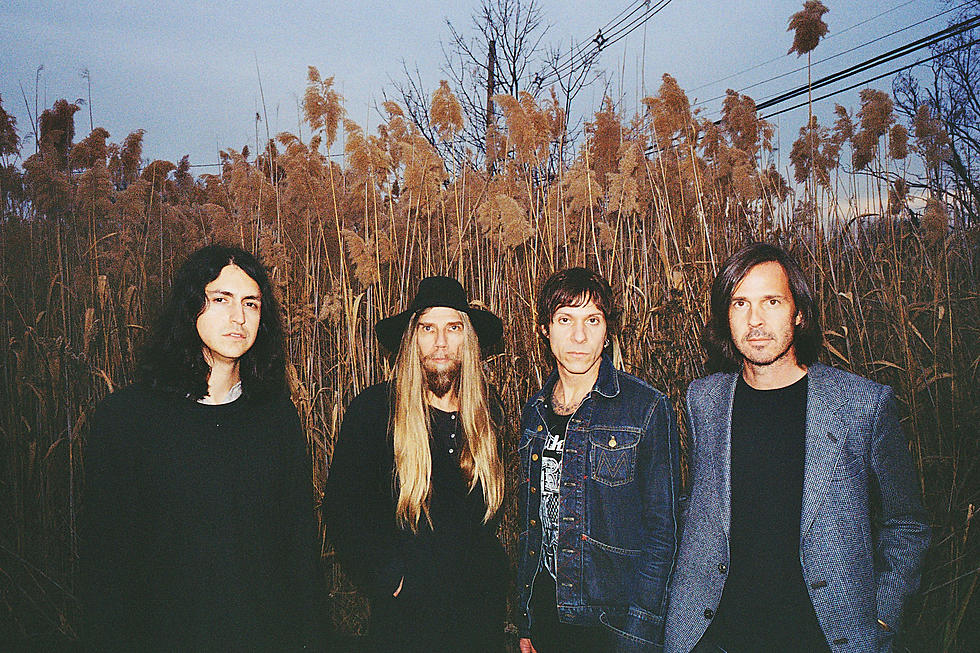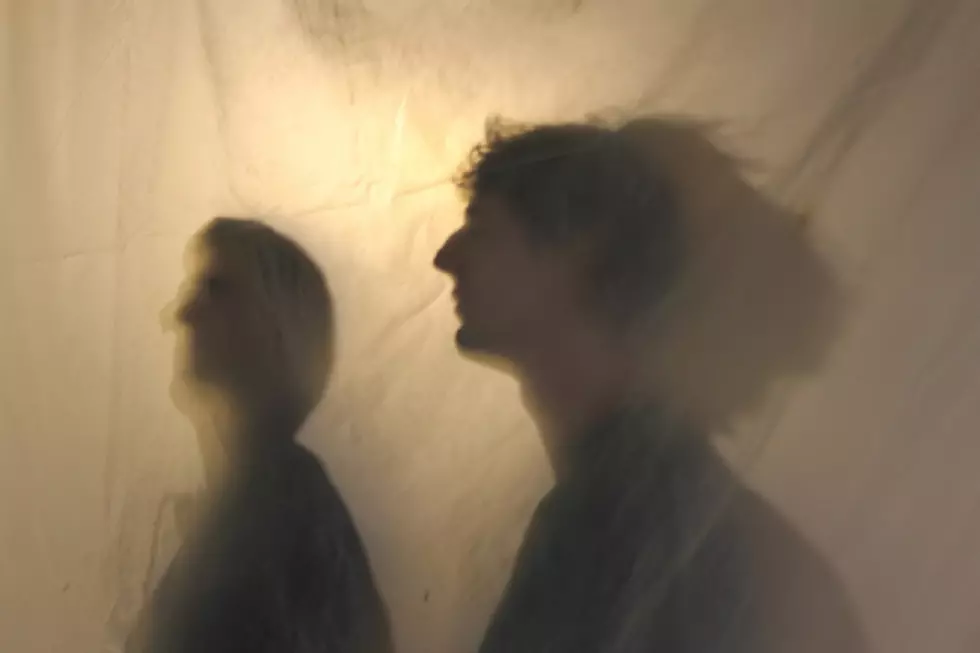
Microwave’s ‘Much Love’ Makes Introspection Hella Fun
The past couple of years, Atlanta, Ga.'s Microwave have been touring their asses off, getting their charged and exciting rock in front of many ears as possible. It's paying off; during Riot Fest a week ago, sandwiched between sets by scene heavyweights Motion City Soundtrack (playing their last show in the area) and the Hold Steady, a sizable crowd still showed up for Microwave, confirming the fact that they're a band you need to drag your friends to see. For all that support, Microwave are repaying the love in full with their sweetest record to date.
Today, the band is premiering their new album, Much Love, which comes out this Friday, September 30, on SideOneDummy. You can immediately hear the tightness in their performance, the ability to incorporate new sounds with familiar and well-executed elements. The album starts with "Roaches," one of their moodiest efforts to date. It's a short track, subtly conveying feelings from bliss to reflection in a flick of a wrist. It's indicative of what the record is capable of, the band's natural energy translating in nearly any song, loud or soft.
"Dull" is anything but, Microwave's most "rock" track to date, riffs striding along and building to an anthemic chorus. Frontman Nathan Hardy's voice is truly an instrument of its own, providing an equally melodic element on "Drown," shifting to screams in "Vomit" when the intensity ramps up. The album is something to behold, a collection of undeniably sweet tunes that can put you through the emotional wringer. Microwave only continue to get better, expanding their sound to new heights and proving that you can still make huge waves in the scene.
Listen to Much Love in full below, and read our interview with singer Nathan Hardy about not only leaving the Mormon church, but how much hot sauce he can take down.
How has the past year been for you guys? I first saw you about a year ago on that You Blew It! tour, and it was wild.
Yeah, for sure. All the tours have been crazy. But that was the first tour that was booked by a booking agent; we had only DIY toured before. Those were like the largest shows we played up to that point. And the Have Mercy thing was a little bit more. The Wonder Years and Motion City were crazy.
What’s your approach to doing these opening sets? I always wonder about that — do you try and outplay the headliner or keep it chill?
Yeah, I don’t know about trying to outdo bands, but we were so different than most of the bands we played with, especially in the larger tours. It was kind of like a different aesthetic or something, so it wasn’t really even a comparison. Everyone has their sort of thing, but we for sure practiced way more this year, and with a click for the first time to get ready for this tour and stuff. We didn’t play with a click live, but we got in-ears for when we practice or warm up. I think it helped — when we used to play shows, we’d speed up by 20 bpm between the beginning and end of the song because everyone would get excited. [Laughs] Especially Tito [Pittard, drummer]. Tito would just speed up and take off sometimes. I’ll usually hear back recordings people take of the show on Instagram and [I'm] wincing the whole time, but the last few times I’ve been able to live with it. [Laughs]
When I first heard your music, what caught me was you were able to pinpoint what makes a band like Taking Back Sunday work. You guys aren’t a pop-punk band, but there’s elements in there, and a conscious effort, it seems, to not get locked in that cycle.
Yeah, Taking Back Sunday is really awesome. I had a theory about this: I feel like music goes in cycles every 20 years; not exactly, but the '70s was a big rock 'n' roll time, and there was masculine super rock stars, and then it gets old for a bit because new bands would just play worse versions of the same kinds of sounds. And then it goes into the '80s; music got weird for a minute, which was cool because Black Flag and Fugazi and stuff introduced new things, but it wasn’t quite as accessible to where it would be in the mainstream, just because it was more of an experimental and raw sound. Then in the '90s, [the] Nirvana and Queens of the Stone Age sound, where they could bring the '80s punk stuff, but have the more rock 'n' roll aesthetic. And then in the 2000s, there was a similar sort of thing — bands like Brand New and Taking Back Sunday are really fucking sick and two of my favorite bands, and they were really raw and emotional, and there’s this “whiny” element that I love, but I understand how it couldn’t quite break through to some people. Like my older brother and stuff, who likes Disturbed and Nickelback. [Laughs] But he’d always make fun of it with the whiny voice. And Blood Brothers is one of my favorite bands, and he totally has that hardcore, nasally high voice, which is fucking awesome. Maybe because it’s just raw, pure emotion. Hopefully, there’s a way to bring the new sounds introduced with that; and I feel like music got more dynamic, but I feel like it will go full circle. Everyone has that '90s alternative sound with Basement and Title Fight.
The thing I noticed off the bat for Much Love was, while Stovall had a level of energy and quickness to it, it also sounds really confident in that a lot of it is also slower and it takes its time. How did that happen?
We just jammed and wrote songs. We wanted to experiment with other kinds of songs and not write a song that was a thing we already had and whatnot. We’d been super into Queens of the Stone Age, and I loved how they had faster, upbeat rock songs and also these slower, jazzy, smooth songs. Josh Homme said when they started, their goal was to write any type of song and not have an aesthetic. Which I think they inadvertently got one, because they have an aesthetic and sort of a sound or whatever. We all love noisy stuff, too. What we jam at practice, we find whatever weird noises we could make with pedals and stuff. Brand New also influences that, too, because I always loved how they would make noise, but it never takes over the song. It’s this thing you could almost miss unless you heard it back a few times, but there’d be a screech. I love that nuance. But yeah, a lot of stuff did get slowed down.
We aren’t planning on permanently slowing down. I think our next release is going to be a lot heavier. We’re not trying to make softer songs, but I think it was where we were at when we were recording these songs. And it probably had a lot to do with, I started smoking weed when I left the church around the time I started the band. [Laughs] The whole time we were writing this record, I was pretty much high for two years. But I’ve hit this point now where I’m anxious if I can’t smoke all the time. But writing this, I think that might have had something to do with it. You end up playing slower things that are headier. [Laughs] I always think about old blues singers; you listen back to Lightnin' Hopkins and Skip James, Muddy Waters, it just makes sense. They have these super slow parts just sitting on the porch. You couldn’t not get high; you couldn’t write something this slow and be patient, vibing out on it. [Laughs] And bands like Sleep, too. We love Neurosis and Mastodon, those kinds of bands.
I’m curious, what was that time like? You leave the church, you start smoking weed and drinking and stuff for the first time. What was it like in the beginning of that?
It was pretty stressful. Even after we put out Stovall, I hadn’t talked to my extended family about the fact [that] I’d stopped going to church. I didn’t really live near my parents or anyone, so I wasn't disclosing my whole life. I’m not like extremely close with my family either, to an extent. It came to a point where we put the split out, [and] because I talked about it more openly and stuff, I realized I needed to talk to my parents. And now, they all sort of ... my aunt would call me, and I’d be completely sober and she’d say, “You sound a little messed up, Nathan.” [Laughs] Because they’re all, they live inside a bubble and [are] not into anything.
Is your family cool with it now, or is it still kind of a weird issue?
I think we’ve just, as of the last few months, reached an agree-to-disagree kind of thing. It was sort of [at the point where they would] try to prod and talk about church things and stuff, and get me to admit I had some type of faith in something. Pretty adamantly, I’d researched everything heavily while I was a missionary, [and] theologically or whatever was realizing the doctrine — and historically in the church, they taught that — was outrageous. And I really strongly believe if you make decisions based on faith, it’s irresponsible to do things based on feelings you have and stuff. I talked to people while I was a missionary that had, like, prayed and received some answer they were supposed to marry a guy, and then they [got] married, and the guy ended up being a child molester who molested their kid. And then we’d meet at the missionary, and they’d be [like], “How am I supposed to trust my answers from God now? Obviously, that wasn’t a real answer, because God would never tell me to marry someone who was a child molester and would want to molest my children.” To me, if you’re not approaching it from a faith or church standpoint, it’s like, “Well, obviously, you shouldn’t make decisions based only on feelings.” [Laughs]
But if you are willing to do that, you’re on the same level as people who crashed planes into the World Trade Center or something. They grew up with specific influences and stuff, and if you were in the same environment, a radical sort of mindset, you’d probably do the same thing. Everyone’s first reaction to leaving the church is, “Oh, he just wants to do bad things and sin,” or something, but I wholeheartedly disagree with it. I don’t think it can be solved; if they say things to me now, I’ll just shut them down.
Was it sort of getting away from Mormonism as an institution or losing the belief of there being a God?
It was both. The institution of Mormonism, too, they send people to your door to see why you’re not going to church. They sent the missionaries out and stuff, and [tried to] reel me back in or whatever. But I mean, in general, too, after I stopped being religious, I went through a time where I was just trying to look into the pseudo-science kind of thing: alternative medicine and ghosts and all that. Like, is there any bearing to metaphysical shit or whatever? Because everyone wants to transcend their mortality; maybe there’s some other planet that they can live on. But everyone wants to have some way for their soul to live on, so I tried to research other ways for that to be possible. But I’m pretty sure there’s at least not good proof there’s anything else, no solid evidence there isn’t anything else. Although each thing is based in faith, and atheism people will say [their philosophy] is also based in faith and that agnosticism, we don’t really know anything. If there was really good proof of anything, I hope I would accept it. But based on the current options, there isn’t any reason to believe anything other than we’re meat sacks and rot in the ground. [Laughs]
Was that difficult to come to terms with? People I know who have lost the faith, the hardest thing to see them come to terms with is the idea that there might not be anything after this, because when you’re born into it, you always have this idea that everything will work out and there’s nothing to worry about.
It was, to an extent, but at the same time, it was liberating. Simultaneously, I had this stark determinism realization. There’s this book Outliers by Malcolm Gladwell, where he researched the hockey players in Canada, where 30 percent are born in the first three months, because that was the age cut-off for hockey, when they were five years old. When they were five years old, they were significantly larger than the other kids, and ended up being pro hockey players. And there’s these sort of patterns of people who do great things, the 10,000 hour rule and stuff. Part of the thing about having a soul and everything, you’d look at Paul in the Beatles and think, “Wow, he was born with these abilities and he’s so talented.” But if you realize people are the product of their influence ... each life is the result of things they were exposed to because this extreme prepared them for it. And Paul McCartney spent so much time playing songs and writing for seven hours two nights a week at some nightclub with his band, and if you do something enough, you become great at it or whatever. So, it kind of has this ... if you don’t have a soul, life is kind of this game where you can research someone and see the patterns that make them become that. There’s slight biological factors, but I feel like mostly everything is the result of influences and everything. It’s kind of cool, because you don’t have to hope you get some spiritual influence, because if there’s nothing else out there, you’re in control. [Laughs] And if you don’t like the way your life is right now, it won’t be something that’s out of your control. You just figure out the steps needed to change it.
Is it important to have an element of humor in your music? There’s a lyric about eating beans with hot sauce that cracked me up, and it’s such a small thing, but it’s a nice balance.
For sure. I always have this thought, when we’re talking about philosophical or deep things — it’s almost this cliche to write meaningful songs. You go to shows and people always say they connect with your songs, and I always wonder what the motivation is for that. I never want to be too serious; we’re all pretty goofy when we hang out and everything. [Laughs] I don’t want it to seem super serious, some Descartes philosophical level. 'Cause in the end, one of the main influences on the album is life is meaningless and nothing matters; it’s almost pointless to discuss those things, because what really matters in life is drinking margaritas by the pool and hanging out with your friends. [Laughs] It’s nice to talk about how I can eat anything if there’s enough hot sauce on it.
Order Much Love from SideOneDummy.
Follow John Hill on Twitter.
More From CLRVYNT









